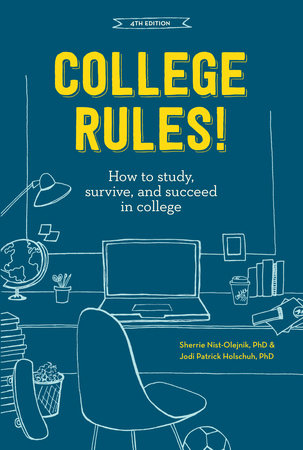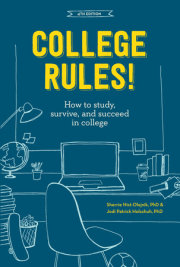How to Use College Rules! Although the primary audience for
College Rules! is students heading off to campus, we believe there is valuable information here for students at any point in their college career. (We even know some graduate students who would benefit.) However, our major goal is helping college freshmen make the often treacherous transition from learning in high school to learning in college.
To this end, approach reading
College Rules! in any way that suits your needs. You can read it the traditional way—start with chapter 1 and read through to the end in consecutive order. If you’re a high school student who will be starting college, this ordered approach might be the best.
You can also use
College Rules! as an at-your-fingertips reference for college success. If you feel a bit hesitant as you’re packing up your stuff to head off to campus, read chapters 5, 9, and 10. If you’re getting ready to take your first college exams (and you haven’t even opened this book yet), read chapters 22, 23, and 24. If you can’t manage your time worth a hoot, read chapter 7. And everyone can probably benefit from reading chapter 6, “Learning 2.0: Technology, College, and You,” early on. In other words, we suggest that you read (or reread) the chapters you think will benefit you at any particular time.
With the second approach, however, we offer a few words of caution. We know for a fact that learning in college is a complex process that involves using all of your senses to learn—you use your vision when you read, you speak in discussion, you listen in class, you touch as you create. Being successful is not about doing this or that. Being successful is usually about doing this
and that (and then doing some more). There’s no one particular suggestion in
College Rules! that’s guaranteed to make you a better student. There are no “magic beans” for college success. Rather, we have provided you with a comprehensive guide to help you hit the campus running at least ten paces ahead of your fellow students.
We wish you the very best of luck as you begin your college journey and hope that, as so many students who had success with the first three editions did, you email us and let us know what you think. Enjoy yourself and have fun—but get your work done, too!
College Rules! will show you how.
Copyright © 2016 by Sherrie Nist-Olejnik, PhD, and Jodi Patrick Holschuh, PhD. All rights reserved. No part of this excerpt may be reproduced or reprinted without permission in writing from the publisher.






